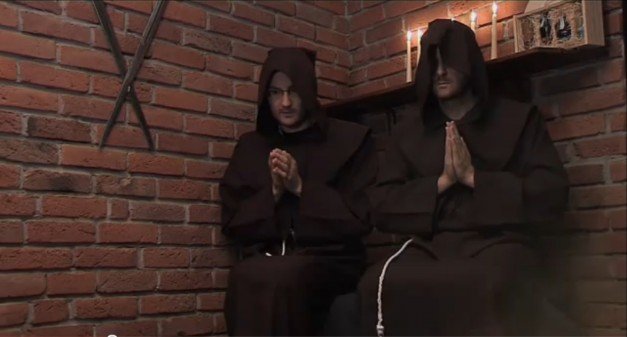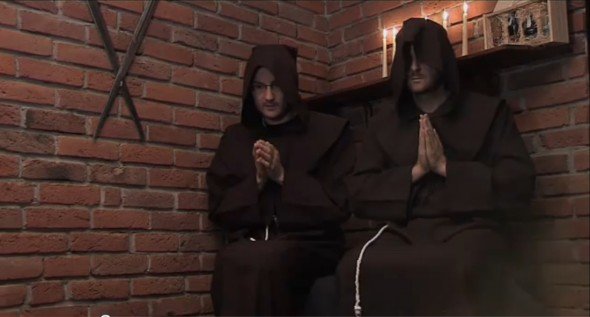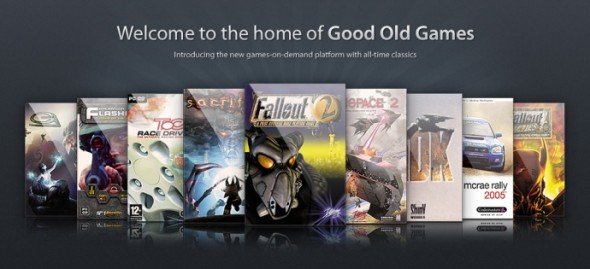Good Old Games on online activation: "it's just bollocks."

It's been a rollercoaster week for retro game publisher Good Old Games . They closed! No they didn't! They're back! They apologised! They're wearing monk costumes! They're making money hand over fist ! What the hell!
Before it all kicked off, PC Gamer sat down with GOG co-founder Marcin Iwinski and Managing Director Guillaume Rambourg to discover the story behind their relaunch, and how they convince publishers to release their games without DRM, how they combat piracy, and their holy mission to improve PC gaming. Warning: this interview contains Poles explaining themselves using slightly awkward metaphors.
To re-iterate - this interview took place before GOG closed their site.

Rich McCormick: So... what's going on?
Guillaume Rambourg: Ah, what a question to start with. Next week we will finally bring back Baldur's Gate to millions of users, which is quite a big achievement and we're really, really thrilled about it. We'll be launching a brand new version of GOG.com with new features and new design and many many things, I think you'll have more questions about it.
Marcin Iwinski: I'm really excited about Baldur's Gate, because historically GOG is part of the CD Projekt Group, and Baldur's Gate was the first major game for us in our Polish business, years back when it was released. It was fully localised in Polish and was a foundation for the growth of gaming in Poland. It's a very emotional connection. Baldur's Gate enabled us to really make gaming massive in Poland, so what I really hope is that Baldur's Gate will be the same for GOG; will make it massive and show people the good old gaming is really cool. I think Baldur's Gate is one of the best games you can pick.
Guillaume Rambourg: There is something I'm very curious about, which is that currently, if you want to buy Baldur's Gate you have to go off to eBay and [it is] really, really expensive, and even after buying a copy you are not even sure if the game is going to be running fine on modern operating systems. So we'll bring back the game at a decent price, fully remastered for Windows, and I'm wondering if gamers will be willing to play it again.
Keep up to date with the most important stories and the best deals, as picked by the PC Gamer team.
Rich McCormick: How do you actually go about getting publishers to sign off on this? How do you get a game like Baldur's Gate?
Marcin Iwinski: Well, we put on the hat and the shoes, you know? And we knock on their doors for two years, walking the path, you know? Essentially, this one was the most complex games we've had. I think early discussions started probably two years ago, and what is most challenging, aside from making the game compatible, is to convince the [publishers of the] DRM free model. But I think how GOG works is step by step convincing every single publisher out there. We just bring revenue and make gamers happy, offering them extremely good value.
But then you have to look at all of the more corporate considerations: who owns what and if they are not, you know, under restructuring and reorganisation or something. And [with] Atari we historically go a long way back, because they were the original publisher of The Witcher, and right now with the Witcher 2 we have a distribution deal with Atari in the US, so we have very strong ties. But still, part of the company will [be sold] – it's all complicating things - and then the guys from GOG.com are knocking on their door and asking "Hey, we are doing good old games, so we can wait, but maybe it's time that we could make a deal”. So at the beginning of the year we came up with a deal for the original Atari stuff, so original games like Archon, Orion and whatnot and then of course the next big priority was to have the Hasbro deal.
Rich McCormick: Are there any games that you want to get on GOG but can't because the publishers have collapsed?
Guillaume Rambourg: In the last two years we have managed to sign a couple of big publishers, and I would say that every big publisher we have signed was perceived as a bottle opener, so step by step we build up our reputation, we show that our values are making sense for users and for publishers, that they can monetise old games and so on, and so you are right, we are still running after a couple of key publishers who we have to convince, but we hope that Baldur's Gate will be the next bottle opener.
Marcin Iwinski: What we are planning to do is send them free download codes and say, "Please enjoy Baldur's Gate here, and [get in touch] if you'd like to have your games on GOG and available legally to all its users." Because the thing with old games is that in a lot of cases you cannot get a legal copy, unless you want to buy a collector's edition or an old boxed copy on eBay. It costs a lot of money and ususally you have a problem with it working, so there is no revenue stream for publishers and there's plenty of people who want to enjoy these games. I mean, how hard is it right now to buy the older Atari/Hasbro RPGs in the UK? It's not that easy to get it retail.
Rich McCormick: Yeah. The only other option would be to pirate it.
Marcin Iwinski: Yeah and then I think people are really reaching for it and then quite often pirating, quite often it's abandonware. You know, the legendary Hasbro/Atari RPGs, they were huge so you still have a chance to get them, but some titles were not that that active commercially. They were really great games but you really have no chance whatsoever to buy them anywhere outside of GOG.

Rich McCormick: Getting it running on the operating system is always the hardest part.
Marcin Iwinski: The funny thing is that when we making deals with some partners our main concern was, "We are very happy to make a deal with you, but we have a tiny little problem, we don't have anything for the games, including the game itself. Can you get them?". That's the funny thing. Looking ten years back, the publishers, the decision makers, they couldn't imagine, and we couldn't blame them for that, that in ten years somebody would be willing to sell this stuff. I think that's a really huge advantage of digital distribution.
Guillaume Rambourg: When you knock on doors asking for rights to certain games, and the games are old, you have to convince them to dedicate some resources on the legal side to clear up the rights, to look for the rights, and so on. As I stressed before, it's just a question of legitimacy. GOG has built up some legitimacy and thanks to it we are convincing companies to look in their attic, to remove some dust and to trust us to take those old games to today's users.
Rich McCormick: Have any old developers thanked you for putting their games on GOG?
Guillaume Rambourg: We have direct deals with developers, and that's another beauty with GoG because again, the titles are really old and the rights have quite often reverted back to the original creators. Then we have the opportunity, instead of making one big deal with the publisher, to go to the developer and say "We are huge fans of your games, let's make a deal together." It's two different worlds because, you know, publishers are publishers. They have big structures and they have to take care of their business but, there is a good example. On Thursday we are releasing Age of Wonders, which is a game from Triumph studios, and basically the rights for those games, the three games of that series, they used to belong to Take Two, and those guys they got back the rights, and they approached us as developers. "Guys, can we have those games on GOG?"
Marcin Iwinski: One of the first developers we sat with was Charles Cecil for the Broken Sword series, and he's a great guy. It's really a pleasure to do business with him. It's part of the cool factor of building GOG.com that you can be in touch with such people, and these games, you know, some of them still have excellent graphics, but it's more because they're great and extremely playable games, and that's the beauty.
Rich McCormick: When you release a game you tend to package it in with additional materials. How do you track them down?
Guillaume Rambourg: It's a lot of digging, a lot lot lot of digging. The thing is we have a design team on board and they are extremely creative and productive. Plus, our testing team, they still have many, many copies of old games in their attic at home. They are collecting games, so it is a lot of hunting, digging, and then a lot of work. When you have assets for an old game, you have them in low resolution and you have to rework everything to make it in a decent format, right? So it's a lot lot lot of digging, but for us it's not hard. Beyond being a business, I would say we have a theological mission to promote the works of gaming, and for us bundling games with free goodies, it's not hard, because this is the way we can convey the right message. Which is that games can be adorable, they can be lovable if you put the passion into it, and that we put soundtracks, wallpapers and so on directly benefits the passion around the products on GOG.
Rich McCormick: What is it about old games that draws you to them?
Marcin Iwinski: To elaborate a little bit more on where the idea comes from, we originate from Poland where the PC market is probably 70% of the business. It was more two years ago and we were already selling a lot of back catalogues, something Sold Out was doing in the UK two years ago. So we're selling millions of these budget games and budget editions at retail here in Eastern Europe were really big stuff.
Something like Baldur's Gate Gold Edition, we had it, and it was very reasonably priced. It was first of all a great offer for the end user, but also an education, a chance to tell the gamer, “This is a legal copy, it costs only a few quid and it's a really good deal." Looking at the piracy history in Poland, quite often that was the first legal game somebody would buy, so it became remarkably successful and educated people: "This is your first cheap game, maybe you will reach for the mid price afterwards, maybe you will reach for the full price."
And hence the need for GOG.com. There are all these new games. If you look at Steam or Direct2Drive, the business is about new games, so either it's a big game that's just released, or it's a massive promotion of something, this is pretty much how the business model works. For us, the business model is more long-term sale. It's about rediscovering the gems of gaming, really, and that's a starting point for a lot of gamers, especially the ones who don't have the highest specs to run the new games. But also for people who remember the old games and would like to play them, and it's much more affordable than buying new games. On top of that, with older games it was much easier to do the DRM free model, which was sort of the base of the concept.
[Continued on next page]

